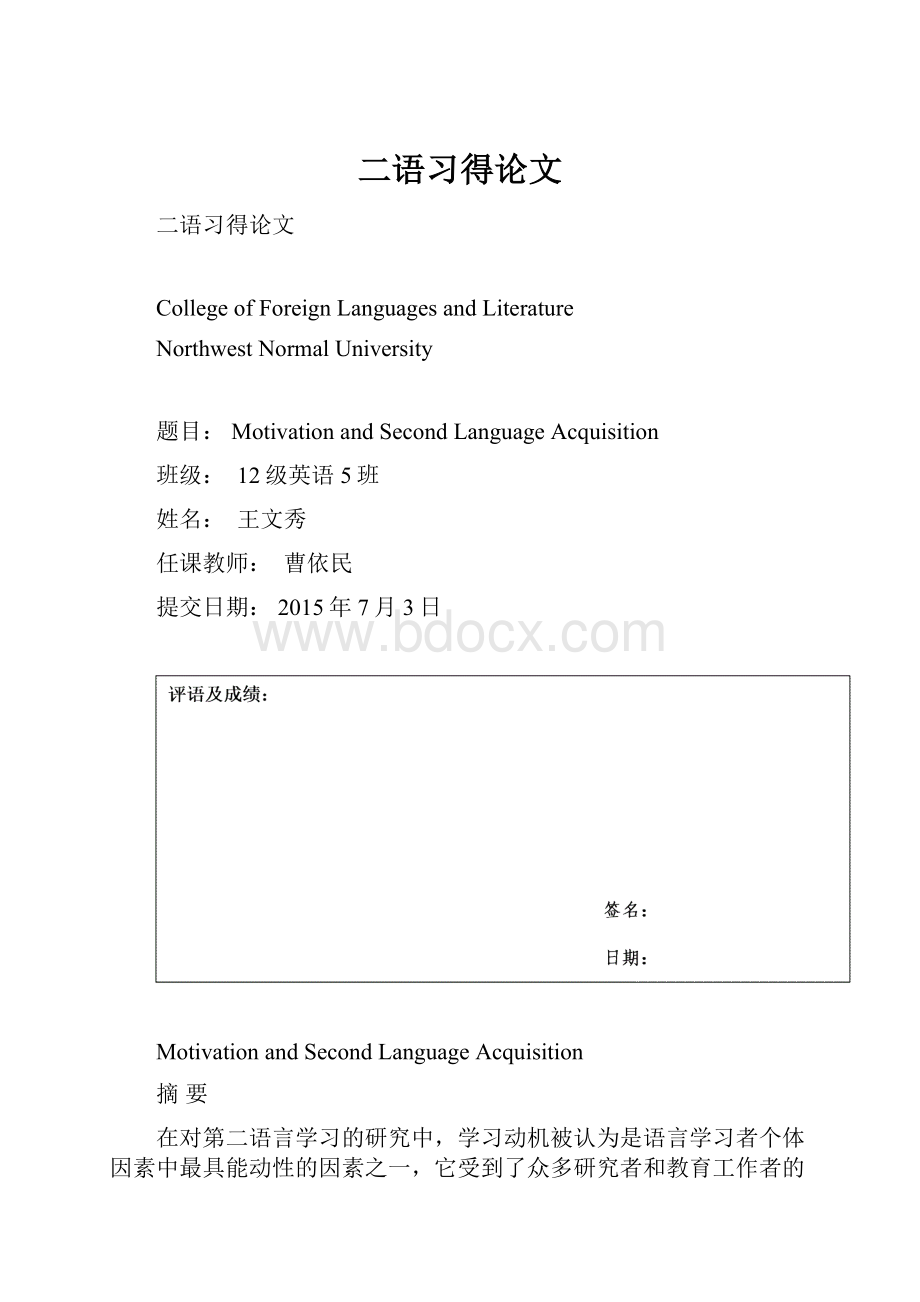二语习得论文.docx
《二语习得论文.docx》由会员分享,可在线阅读,更多相关《二语习得论文.docx(15页珍藏版)》请在冰豆网上搜索。

二语习得论文
二语习得论文
CollegeofForeignLanguagesandLiterature
NorthwestNormalUniversity
题目:
MotivationandSecondLanguageAcquisition
班级:
12级英语5班
姓名:
王文秀
任课教师:
曹依民
提交日期:
2015年7月3日
MotivationandSecondLanguageAcquisition
摘要
在对第二语言学习的研究中,学习动机被认为是语言学习者个体因素中最具能动性的因素之一,它受到了众多研究者和教育工作者的关注。
随着全球化的发展,第二语言的重要性显而易见。
这就要求我们要深入研究了解动机与第二语言学习。
本文将从理论和实际应用的角度研究第二语言习得中的动机问题。
本文先从学习动机的定义出发阐述不同语言学家对动机不同角度的定义,包括被语言学家公认为合理的由Gardner&Lambert所下的定义,以及从人本主义角度出发的马斯洛的需求理论中对动机的定义,从而发现这些定义的局限性。
在阐述定义的基础上,文章从行为主义、人本主义及认知角度分别运用强化理论、需求理论及归因理论来研究及分析动机,说明对第二语言研究的意义。
随后采用语言学家Keller对影响学习动机的四大主要因素的划分,从兴趣、相关性、期待及对结果的满意度简要阐述影响学习的因素及其影响。
本文旨在帮助第二
positivestateofpsychologyinlearningactivity.Regardedasoneimportantelementinlanguagelearning,motivationhasbeenexploredformorethanfiftyyearsbyalotoflinguists,buttheawkwardsituationstillexistsinpresentlanguagelearningsetting.Manyexpertshavedonealotofresearcharounditandmadecontributionstoit.
Withthedevelopmentofglobalization,theimportanceofthesecondlanguageacquisitionisobvious.Soitisnecessaryforustoprofoundmotivationandsecondlanguageacquisition.Thispaperaimstoexploreandanalyseslanguagelearningmotivationfromdifferentperspectives:
behaviorism,humanismandcognition,makingreferencetovariousclassificationsanddefinitionsofmotivation.
Thethesisismadeupofsixpartsbesidesanintroduction,aconclusionandabibliography.Parttwoisliteraturereview.Partthreepresentssomebasictheoriesinmotivation.Inthispart,behaviorism,humanismandcognitionarediscussed.Partfourisanalysisoffactorsaffectingmotivationindetail.Itconsistsofinterest,relevance,expectanceandsatisfactionoroutcomes.
Thispaperpaysattentiononthreequestions:
1.Whatisthedefinitionofmotivation?
2.Whatarefactorsaffectingmotivation?
3.Howdoesthemotivationaffectsecondlanguageacquisition?
2.Literaturereview
Althoughtheterm"motivation"isfrequentlyusedineducationcontexts,thereislittleagreementamongexpertsastoitsexactmeaning.Variousdefinitionsofmotivationhavebeenproposedoverthecourseofdecadesofresearch.WhatweconcernaboutmotivationismainlyconfinedtoEFLstudy,soweshouldputouremphasisonspecificcategory.
Fromthemiddleof20thcentury,especiallyaround1990s,newdefinitionsappearedwiththedevelopmentsinpsychology.Motivationwasthenredefinedasadynamicprocessratherthanastaticinnerstate.However,thereisstilldisagreementaboutthedefinitionofmotivation.
2.1DefinitionsofMotivation
Motivationisoneofthemaindeterminantsofsecondlanguagelearningachievementand,accordingly,thelastthreedecadeshaveseenaconsiderableamountofresearchinvestigatingthenatureandroleofmotivationintheL2learningprocess.MuchofthisresearchhasbeeninitiatedandinspiredbytwoCanadianpsychologists,RobertGardnerandWallaceLambert,who,togetherwiththeircolleaguesandstudents,groundedmotivationresearchinasocialpsychologicalframework.
2.1.1Gardner'sDefinition
It'sthefactthatGardner'sdefinitionofmotivationinSecondLanguageAcquisition(SLA)isthebestknown,frequently-quotedandunderrevisionwiththetimepassing.GardnerandLambert(1972)define‘motivation’intermsoftheL2learner’soverallgoalororientation.Gardneralsoproposedthatallthesethreecomponentswerenecessarytoproperlydescribemotivationinlanguagelearning.Anysingleoneofthemcannotreflecttruemotivation,sotheymustco-existwitheachother.
Eightyearslater,GardnerandMaclntyre(1993)definedmotivationas"thedesiretoachieveagoal,effortextendedinthisdirectionandsatisfactionwiththetask."Gardner'sdefinitionisbasedonsocialpsychologystressingthesocialnatureofL2learning.Inhisview,apartfromlearninggrammarandlanguageskills,thelearningofanL2involvesanalterationinself-image,theadoptionofnewsocialandculturalbehaviorswhichhaveasignificantimpactonthesocialnatureofthelearner.Asweknow,Gardnerandhiscolleagues'researchesareconductedamongtypicallybilingualsetting---Canada,wherelearners'languagelearningisgreatlyinfluencedbythelearners'attitudetowardsthetargetlanguage,thereforethereisinevitablelimitationsexistinginthisdefinitionbynature.Besidesitsshortcomings,Gardnerandhiscolleagueshadmadegreatcontributionstothemotivationresearchinthelate1980s;othertheoristsbegantochallengehistheoryandre-conceptualizetheconstructofL2learningmotivation.
2.1.2Brown’sDefinition
Brown(1981)identifiesthreetypesofmotivation:
(1)globalmotivation,whichconsistsofageneralorientationtothegoaloflearningaL2;
(2)situationalmotivation,whichvariesaccordingtothesituationinwhichlearningtakesplace(themotivationassociatedwithclassroomlearningisdistinctfromthemotivationinvolvedinnaturalisticlearning);(3)taskmotivation,whichisthemotivationforperformingparticularlearningtasks.
2.1.3WilliamsandBurden'sDefinition
WilliamsandBurden(1997)definedmotivationas"astateofcognitiveandemotionalarousal,whichleadstoaconsciousdecisiontoact,andwhichgivesrisetoaperiodofsustainedintellectualand/orphysicaleffort,inordertoattainapreviouslysetgoalorgoals.”Inordertomakethisdefinitionmoreclearly,WilliamsandBurden(1997)presentedathree-stagemodelofinteractivefactorswithinthesocialcontext:
reasonsfordoingsomething----decidingtodosomething---sustainingtheeffortorpersisting.
Fromthismodel,wecanseethatfirstlytheremustbesomereasonstoimpellearnerstoundertakeaparticularactivity;secondly,weshouldconsiderwhatisactuallyinvolvedindecidingtodosomethingandanindividualmayhavestrongreasonsfordoingsomethingbutwithouttakingactualaction;thirdly,peopleneedtosustaintheeffortrequiredtocompletetheactivity.Inthismodel,"decidingtodosomething"playsacentralrole.
2.1.4Maslow'sDefinition
AccordingtoMaslow,"motivationisconstant,neverending,fluctuatingandcomplex,anditisanalmostuniversalcharacteristicofparticularlyeveryorganicstateofaffairs.”Andhis"needtheory"canclearlyandsatisfactorilyexplainthelanguagelearners'motivationinallthelearningenvironments.Theneedhierarchyisasfollows(S.S.Chauhan,1985):
2.1.5DornyeiandOtto'sDefinition
DornyeiandOtto(1998)statedthat"inageneralsense,motivationcanbedefinedasthedynamicallychanginginitiates,directs,coordinates,amplifies,cumulativearousalinapersonthatterminatesandevaluatesthecognitiveprocesseswherebyinitialwishesanddesiresareselected,prioritized,operationalizedandsuccessfullyorunsuccessfullyactedout"Inthisdefinition,motivationisviewedasadynamicprocessinwhichmanyvariablesinfluencethelearner'sperformancebuttheydonotmentionthesustainingofthelearningmotivation.
2.1.6Keller'sDefinition
Keller(1983)definedmotivationas"Motivationreferstothechoicespeoplemakeastowhatexperiencesorgoalstheywillapproachoravoid,andthedegreeofefforttheywillexertinthisrespect."
Besidesdefinitionsgivenabove,KanferandAckerman(1989)madeitmoreexplicitbydefiningmotivationas"thedirectionofattentionaleffort,theproportionoftotalattentionaleffortdirectedtothetask(intensity),andtheextenttowhichattentionalefforttowardthetaskismaintainedovertime(orpersistence)."Oxforddefinedmotivationas"whatmakesstudentswanttolearnlanguagesandwhatcausesthemtoputforththeefforttopersistinthisdifficultadventure"(Oxford,1996,p.1).AccordingtoH.WBernard,"motivationreferstoallthosephenomenawhichareinvolvedinthestimulationofactiontowardsparticularobjectiveswherepreviouslytherewaslittleornomovementtowardsthosegoals."
Inviewofallthesedefinitions,wecangettheinformationthatlanguagelearningmotivationisthereasonforlearningthelanguage,thecentralforceorinnerpowerthatimpulsespeopletogointhelanguagelearningprocess,howmuchconsciousintellectualandphysicaleffortthelearnersmaketoattainapreviouslysetgoalandhowlongthelearnerkeepsthiseffort.
3.TheoriesonMotivation
Motivationisavastandcomplicatedsubjectwithmanytheoriesineducationalpsychology.Themainapproachesarebehavioral,humanisticandcognitiveones,whichhighlightdifferentdimensionsofmotivation.However,thereisnoabsolutely,straightforwardlyandunanimouslyacceptedconceptofmotivation,letalonethedescriptionofitsnaturewithinoneframework.Differentfromtheinstincttheorystudyingtheinnatecharacteristicsofmotivationborninhumanbeings,thebehaviorismattachesmoreimportancetotheexternalfactorsforthestudyofmotivation.
3.1Behaviorism
Behaviorism,atheoryaboutanimalandhumanlearningwaywhichonlyfocusesonobjectivelyobservablebehaviorsanddiscountsmentalactivities,hasanimportantimpactonpsychology,educationandlanguageteaching.
BehavioristslikeSkinnertakethenotionthatbehaviorisafunctionofitsconsequences,sothelearnerswillrepeatthedesiredbehaviorifpositivereinforcement(apleasantconsequence)followthebehavior.BehavioristsprefertoexplainhumanbehaviorswithformulaS---R,believingmotivationisakindofimpulsiveforcearousedbyoutsidestimuli.AccordingtoSkinner,motivatedbehaviorresultsfromtheconsequencesofthesimilarpreviousbehaviorandinotherwords,theconsequencesofpreviousbehaviorinfluencelearners.Oncelearnersobtainpositivereinforcementforcertainbehavior,theytendtorepeatitwithvigor,viceversalearn